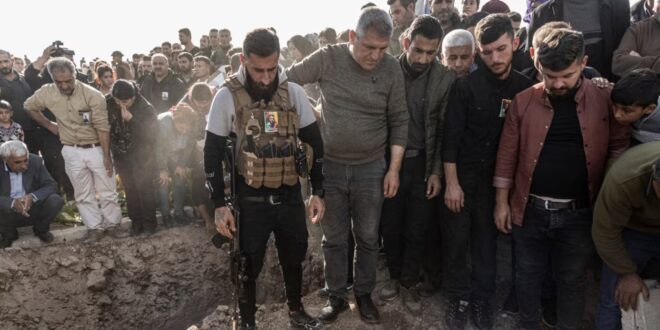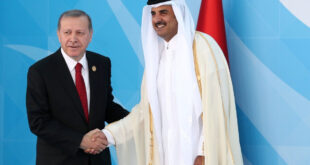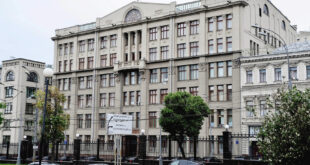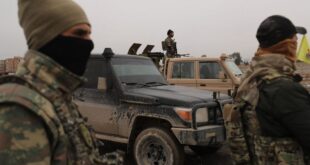Thirteen years after the start of Syria’s conflict, countless woes remain for millions of Syrians. For people in the Kurdish-majority northeast, one concern tops all else: whether neighboring Turkey will carry out another ground invasion that could put an end to their semiautonomous region, carved out in the wake of the civil war.
“People here have been accustomed to shortages of electricity and water, lack of basic services and bad infrastructure, but one thing that they will never like is a Turkish military operation in their region,” said Mahir Qerno, a senior editor at Arta FM, a local radio station that broadcasts in Kurdish, Arabic and Syrian.
Arta FM’s headquarters is in the town of Amuda, about 2 kilometers (just over 1 mile) from the Turkish border. Amuda is one of many Syrian border towns that have been under the control of U.S.-backed Syrian Democratic Forces.
The SDF has been a major U.S. partner in the fight against the Islamic State terror group, also known by its Arabic acronym, Daesh. The Kurdish-led military alliance is viewed by Turkey as an extension of the Kurdistan Workers’ Party, or PKK, an insurgent group that has been fighting for greater Kurdish rights in Turkey. Ankara and Washington regard the PKK as a terrorist organization, but the U.S. makes a clear distinction between the SDF and PKK.
In recent years, the Turkish military has carried out several campaigns in northern Syria, dislodging Kurdish forces from areas such as Afrin, Ras al-Ayn and Tel Abyad.
Turkish leaders have threatened to wage another ground invasion in northeast Syria.
“After those invasions in Afrin and Ras al-Ayn, people certainly don’t want to see Turkish tanks rolling from over there,” said Qerno, pointing toward the Turkish border as he stood in his office.
One glimmer of hope for Kurdish residents in northeast Syria is the presence of several hundred U.S. soldiers stationed at seven facilities across the region. The U.S. says it has about 900 troops in the area as part of a global coalition to defeat Islamic State terrorists.
The U.S.-Kurdish partnership in Syria has led to the physical defeat of IS’s so-called caliphate.
Kurdish officials say nearly a decade of close partnership has created trust between the Americans and Kurdish forces.
“This trust should not be squandered,” said Salih Muslim, co-chair of the Democratic Union Party, the de facto ruling party in northeast Syria.
“Unlike other U.S. deployments elsewhere, the U.S. military engagement in Syria has been cost-effective,” he told VOA. “With a minimal military presence, the U.S. has been able to achieve major successes here. That’s because our partnership is so unique in that our forces do the actual fight, while the Americans provide advice and assistance.”
Muslim said Americans have assured them that they will keep troops in Syria until a political settlement for the war-torn country has been reached.
The Kurdish leader also said that he recognizes the U.S. relationship with Turkey, a NATO ally. But he still believes that any Turkish invasion into northeast Syria could disrupt U.S. anti-terror efforts in the region, especially as IS militants in recent months have stepped up attacks against SDF forces.
“The Americans are concerned that if a ground Turkish operation against us starts, it will force us to withdraw our forces from elsewhere to fight the Turks,” Muslim said. “This means our southern flank will be exposed to Daesh attacks. And Americans don’t want to see that.”
U.S. officials have in the past expressed concerns about military escalations in northern Syria, particularly about the impact on civilian populations and the effect it could have on anti-IS efforts.
Turkey has periodically carried out drone and air strikes against Kurdish forces in Syria. Turkish officials say such attacks aim to destroy the organizational infrastructure and sources of income for “terrorist organizations,” referring to Kurdish forces.
Nicholas Heras, senior director of strategy and innovation at the New Lines Institute, said the U.S. military presence in northeast Syria is sufficient to maintain often-threatened stability for the local population.
“But [it is] insufficient to provide the security conditions for sustainable rehabilitation and reconstruction of that U.S.-backed region,” he told VOA.
Heras, who has extensively researched Syria, said the U.S. strategy in the country emphasizes keeping a low profile on the ground while having a high impact on the calculations of adversaries such as Russia and Iran, two staunch allies of Syrian President Bashar al-Assad.
“This approach is useful for Washington because it keeps northeast Syria out of sight, and out of mind … to the average American voter,” he said. “But it is a tenuous policy that creates enough ambiguity regarding American intentions that multiple actors such as Turkey, Russia and Iran are constantly testing U.S. resolve in northeast Syria, often to the detriment of local Syrian partners.”
 Eurasia Press & News
Eurasia Press & News




